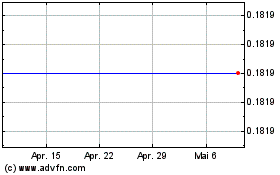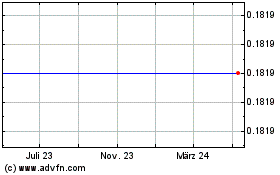Today's Logistics Report: Economy's Growth Track; Retrenching Retailers; Tesla Goes Online
01 März 2019 - 4:44PM
Dow Jones News
By Paul Page
Sign up: With one click, get this newsletter delivered to your
inbox.
New figures show the U.S. economy firing on all cylinders even
as clouds may be forming on the horizon. The economy completed one
of the best years of a near-decadelong expansion, the WSJ's Harriet
Torry reports, growing at a modest 2.6% pace in the fourth quarter
despite slowdowns elsewhere in the world, turbulent financial
markets and uncertainties over trade. The expansion was built on
stronger consumer spending and business investment that economists
say could set the groundwork for continued growth. Some of that
investment may not push new business through the shipping economy,
however, since the largest share was in software while investment
in physical structures fell back for the second straight quarter.
Inventories also expanded again after strong growth in the third
quarter. Some economists believe companies could pull back
inventory plans after that surge, and early figures from seaports
suggest inbound flows are already slowing.
Holiday sales are no longer enough to prop up some of America's
big retail chains. J.C. Penney Co. and Victoria's Secret parent L
Brands Inc. both are closing stores after the chains reported
declining sales in the holiday quarter, the WSJ's Suzanne Kapner
and Khadeeja Safdar report, signaling the U.S. retail landscape is
still resetting even amid strong consumer sales. The mall stalwarts
are joining a parade of brands that are shrinking their footprints
while giants like Amazon.com Inc. and Walmart Inc. grab a growing
share of consumer spending. The latest reports display a stark gap
between winners and losers in the business. Both Amazon and Walmart
posted strong sales, along with electronics chain Best Buy Co. and
discount apparel seller TJX Cos. Sales at Macy's Inc. barely
expanded last quarter, however, and the department store is cutting
staff as it invests more in its supply chain.
Tesla Inc.'s next step is to become an e-commerce company. The
Silicon Valley auto maker is eliminating most of its storefronts
and shifting all its global sales online, the WSJ's Tim Higgins
reports, as it begins taking orders for the long-awaited $35,000
version of its Model 3 compact car. The big change comes as the
company is trying to trim costs while building up momentum in its
supply chain in an effort to become a mainstream auto maker. Tesla
will keep some of its stores open so customers can see the
vehicles, but purchases will be pushed online in a sharp change
after it upended the auto industry's franchise dealership model
with its own sales sites. The company has been able to ramp up
production of its new sedans, but cutting the prices at the same
time has hit Tesla's finances and strained relations with some
suppliers.
SUPPLY CHAIN STRATEGIES
A big-name supplier is stepping back a bit from the frenzied
aerospace manufacturing market. Rolls-Royce Holdings PLC says it
won't compete to provide engines for Boeing Co.'s new midsized
aircraft, the WSJ's Carlo Martuscelli reports, saying it couldn't
commit to an ambitious timetable the jet maker is setting for the
plane. The decision effectively leaves Pratt & Whitney and the
CFM International joint venture of General Electric Co. and Safran
SA in the running for the lucrative business, and it marks a
high-profile withdrawal from aviation supply chains that have been
under heavy stress as the jet makers press suppliers to keep up
with growing demand. Rolls-Royce is facing its own pressures after
losing $3.92 billion in its most recent quarter. After costly
problems with its newest engine, the engine supplier isn't willing
to gamble future revenues on a likely risky proposition.
QUOTABLE
IN OTHER NEWS
Brazil's economy grew a disappointing 1.1% in the fourth quarter
and over the full year in 2018. (WSJ)
India's economy expanded 6.6% in the fourth quarter. (WSJ)
A measure of manufacturing activity in the U.S. Midwest rose
last month at the fastest pace in two years. (MarketWatch)
Companies face growing shareholder pressure to disclose their
exposure to climate-change risks. (WSJ)
Gap Inc. is separating the discount apparel Old Navy retailer
from the rest of the business. (WSJ)
Anheuser-Busch InBev SA's North American volumes fell 0.4% last
quarter in an ongoing consumer move away from mass-market beers.
(WSJ)
German pharmaceutical and chemical company Merck KGaA wants to
buy Versum Materials Inc. for more than $5 billion. (WSJ)
South Korean exports contracted for a third straight month in
February. (Reuters)
A study says Chinese retaliatory tariffs are costing U.S.
exporters $40 billion worth of annual trade. (Bloomberg)
Ford Motor Co. is cutting 2,000 jobs from its main China joint
venture after sales there fell nearly 40%. (Nikkei Asian
Review)
AlixPartners says container lines' ability will need to recover
$10 billion in additional costs of meeting new anti-sulfur
regulations. (Shipping Watch)
European regional carrier MPC Container Ships more than doubled
its fourth-quarter loss to $5.1 million. (TradeWinds)
Air Transport Services Group Inc.'s adjusted fourth-quarter
earnings rose 23% to $24.1 million. (The Loadstar)
Freight forwarder Panalpina's consolidated profit rose 32% last
year to $75.8 million despite weaker results in ocean freight
business. (Lloyd's Loading List)
United Parcel Service Inc. wants to place a distribution center
at a former Boeing manufacturing site in Long Beach, Calif. (Los
Angeles Business Journal)
ABOUT US
Paul Page is deputy editor of WSJ Logistics Report. Follow him
at @PaulPage, and follow the WSJ Logistics Report team on Twitter:
@CostasParis, @jensmithWSJ and @WSJLogistics.
Write to Paul Page at paul.page@wsj.com
(END) Dow Jones Newswires
March 01, 2019 10:29 ET (15:29 GMT)
Copyright (c) 2019 Dow Jones & Company, Inc.
J C Penney (NYSE:JCP)
Historical Stock Chart
Von Mär 2024 bis Apr 2024

J C Penney (NYSE:JCP)
Historical Stock Chart
Von Apr 2023 bis Apr 2024
